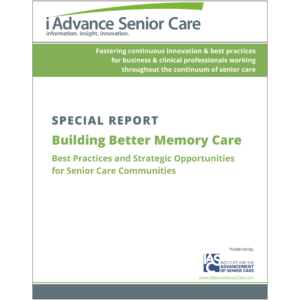Sanjay Gupta on longevity
Longevity is about living a healthy lifestyle and learning to focus on wellness rather than illness, said Sanjay Gupta, MD, in a keynote session at the 2016 LeadingAge Annual Conference in Indianapolis, Indiana.
Gupta, a neurosurgeon who also serves as the chief medical officer of CNN, spoke to a packed hall on what longevity means in today’s society and how care providers can help their residents live up to their potentials.
The Information Age has changed the way people seek information and how they process what they learn. Despite the Internet, “It's hard to find quality knowledge about longevity. So, many of our thoughts come from the generations before us, including our parents,” Gupta said. That can lead to a preponderance of outdated—or outright wrong—ideas about health and wellness.
Care providers at all levels of care need to take the time to explain what medical diagnoses mean and what the goals of the treatment plans are. “You can't just tell people the what, you have to explain the why to them as well,” Gupta said. That goes for staff training, too, where connecting the dots on care protocols can improve retention and understanding. “Take the few extra beats to explain why something should be done” or why it works, he adds.
The definitions of health and longevity are adversely affected by nutrition trends—or people’s misinterpretation of them. Fat often is viewed as the big food foe, but the real enemy is sugar, Gupta said. “In America, low fat became synonymous with health. But it also became synonymous with high sugar.”
 If you put a hamburger and some sugar in front of people and ask them which one is more likely to cause heart disease, “Almost everyone would choose the hamburger and almost everyone would be wrong,” he explained. Studies show lowering fat intake has had some impact on lowering the rates of heart disease, but society may have simply traded one chronic disease for another, he added. “Over the past few decades, there's been an explosion of obesity and diabetes.”
If you put a hamburger and some sugar in front of people and ask them which one is more likely to cause heart disease, “Almost everyone would choose the hamburger and almost everyone would be wrong,” he explained. Studies show lowering fat intake has had some impact on lowering the rates of heart disease, but society may have simply traded one chronic disease for another, he added. “Over the past few decades, there's been an explosion of obesity and diabetes.”
The long-term care industry has a surging interest in memory care, including brain exercise as a pre-emptive strike against cognitive decline. Technology and games that engage residents in memory improvement, reasoning skills and processing speed can help keep the brain’s neural pathways nimble, although processing exercises may stave off dementia the best, he said.
To live a long life, focus on activity, nutrition and sleep/rest, Gupta said. His final advice: “Do something every day that scares you.”

Pamela Tabar was editor-in-chief of I Advance Senior Care from 2013-2018. She has worked as a writer and editor for healthcare business media since 1998, including as News Editor of Healthcare Informatics. She has a master’s degree in journalism from Kent State University and a master’s degree in English from the University of York, England.
Related Articles
Topics: Alzheimer's/Dementia , Articles











